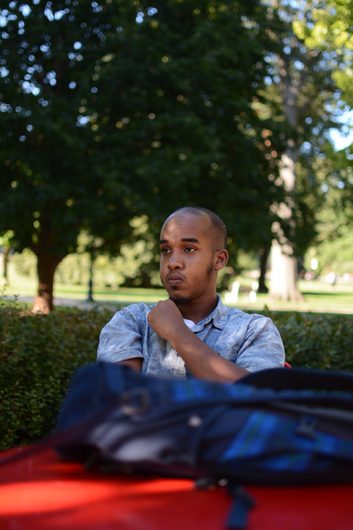
Abdul Razak Artan sits pensively on the Oval. Credit: Kevin Stankiewicz | Oller Reporter
Abdul Razak Ali Artan was born in Mogadishu, Somalia, graduated from high school in Islamabad, Pakistan, and finally found himself in Columbus. Here, he was a refugee applying for permanent residency, having graduated with high marks from Columbus State Community College with an associate degree in liberal arts. In August, he enrolled for his first term at Ohio State.
But sometime between August and Nov. 28 — when Artan attacked OSU students, a professor and other bystanders, first with a car and then with a knife — something had changed. He applied to OSU with a 3.7 GPA from Columbus State, and had been accepted into the Fisher College of Business. But two weeks before the attack, Artan requested that he be dropped from all of his classes.
“Andrea, could you please drop me out of all classes?” he wrote in an email to his adviser, Andrea Evans, on Nov. 13. “This is it. I made this decision. No regrets whatsoever.”
However, Evans alerted Artan that it was too late in the semester to drop the courses. He’d have to just accept the grades earned.
Two weeks later, Artan would be shot dead by University Police officer Alan Horujko after carrying out an attack on campus which would later be claimed by Islamic State. Records from his application to OSU indicate that Artan, who listed English as his native language, had lived in Columbus since 2014, and is survived by seven siblings.
The Lantern obtained the emails on Monday, after receiving Artan’s academic records and application to OSU on Friday, via a separate records request. The email exchange was first reported by The Columbus Dispatch on Saturday as part of a public records request.
The Nov. 13 email exchange, however, was not the first time that a different image of Artan began to appear compared with the student who had graduated with honors from Columbus State.
In mid-September, according to an appointment write-up made after Evans met with Artan, she said he wanted to drop his introduction to managerial accounting course because he didn’t think he could handle the course load with his work commitments. He ended up dropping the class and adding another to keep himself a full-time student.
On Sept. 29, another adviser, Jaimi Knisley, summarized an appointment with Artan that seemed to show a struggle academically.
“Discussed taking a class Pass/Non-Pass. It’s passed the deadline to do this for (Autumn Semester 2016),” the write-up states.
It goes on to state Artan’s alleged declining academic motivation.
“Discussed general motivation in classes. Abdul is feeling unmotivated right now. He already has an Associate of Arts and some certificates, so he’s feeling unmotivated in his current classes,” Knisley wrote. “Talked about withdrawing for the term — W’s (sic) are better than failing grades — or finishing this term and taking time off for the next term. He’s working right now, so he’s enjoying that more than his classes.”
Evans did not respond to a request for comment, and neither did the lecturer listed as the instructor for Artan’s accounting class. An email sent to a family member’s email address listed in Artan’s application to OSU bounced back with an error message. Knisely is out on maternity leave, and was not able to be reached.
FBI spokesman Todd Lindgren said that the bureau was aware of Artan’s grades, and “(looks) at all possible factors involved (in the attack).”
In mid-October, Evans sent an email regarding grades for a business survey class. Artan replied that he was “taking a break from school especially this semester.”
When Evans asked if that meant he did not participate in the group project mentioned in her email, his reply seemed to contradict what he said earlier.
“No im (sic) sorry,” the email reads. “I’ll be staying in school.”
Evans expressed worry about the discrepancies, and set up a meeting with Artan for the next week, on Monday Oct. 17.
At 11:35 p.m. on the night before the meeting was scheduled, Artan emailed Evans thanking her for her patience in working with him that semester.
“First, I want to start off by saying that you have been very helpful and very PATIENT with me. You are a great a (sic) person and I will contact some higher authority at OSU and let them know how helpful you were,” he wrote.
In the next paragraph, however, he said he would be staying enrolled at OSU, though he might not attend all of his classes.
“I really feel I need a break from school, but the financial aid office told me that if I withdrew now, then I might have to pay some more money or I might actually get a refund, so I do not want to take the risk as I do not want to pay any additional fees. So, I am staying in school but I may attend or not attend some classes.”
He canceled the meeting before thanking Evans again.
“Also, I cannot make it to the appointment tomorrow because I just realized that I have work. Again, I am so sorry, and you are a wonderful person to say the least. My friend at work who also goes to OSU, told me that you were once his advisor too and that you were very nice and helpful.”
His next email to Evans would be the one in which he requested to be dropped from all of his classes. It was a far cry from his personal statement in his application to the university.
“Now to achieve those goals, I had to make a lot of sacrifices, and I will do the same for Ohio State,” he wrote. “I will excel and represent Ohio State University in the manner that it deserves. My plan is to graduate with a 4.0 GPA.”


